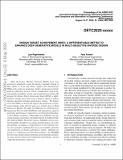Design Target Achievement Index: A Differentiable Metric to Enhance Deep Generative Models in Multi-Objective Inverse Design
Author(s)
Regenwetter, Lyle; Ahmed, Faez
DownloadAccepted version (2.507Mb)
Open Access Policy
Open Access Policy
Creative Commons Attribution-Noncommercial-Share Alike
Terms of use
Metadata
Show full item recordAbstract
<jats:title>Abstract</jats:title>
<jats:p>Deep Generative Machine Learning Models have been growing in popularity across the design community thanks to their ability to learn and mimic complex data distributions. While early works are promising, further advancement will depend on addressing several critical considerations such as design quality, feasibility, novelty, and targeted inverse design. We propose the Design Target Achievement Index (DTAI), a differentiable, tunable metric that scores a design’s ability to achieve designer-specified minimum performance targets. We demonstrate that DTAI can drastically improve the performance of generated designs when directly used as a training loss in Deep Generative Models. We apply the DTAI loss to a Performance-Augmented Diverse GAN (PaDGAN) and demonstrate superior generative performance compared to a set of baseline Deep Generative Models including a Multi-Objective PaDGAN and specialized tabular generation algorithms like the Conditional Tabular GAN (CTGAN). We further enhance PaDGAN with an auxiliary feasibility classifier to encourage feasible designs. To evaluate methods, we propose a comprehensive set of evaluation metrics for generative methods that focus on feasibility, diversity, and satisfaction of design performance targets. Methods are tested on a challenging benchmarking problem: the FRAMED bicycle frame design dataset featuring mixed-datatype parametric data, heavily skewed and multimodal distributions, and ten competing performance objectives.</jats:p>
Date issued
2022-08-14Department
Massachusetts Institute of Technology. Department of Mechanical EngineeringJournal
Volume 3B: 48th Design Automation Conference (DAC)
Publisher
American Society of Mechanical Engineers
Citation
Regenwetter, Lyle and Ahmed, Faez. 2022. "Design Target Achievement Index: A Differentiable Metric to Enhance Deep Generative Models in Multi-Objective Inverse Design." Volume 3B: 48th Design Automation Conference (DAC).
Version: Author's final manuscript